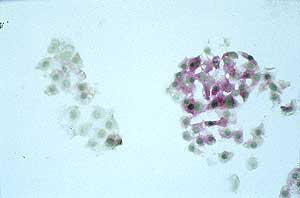 |
|||||||||
|
Research Feature Stories: Other News: |
Goal Is to Understand Liver Damage and Test Antiviral Agents
Hepatitis C spreads primarily through contact with infected blood, and is estimated to infect about 3 percent of the world’s population, including some 4 million Americans. In the United States, the UW hepatitis C research center and five similar centers form a multi-disciplinary scientific network to expand several investigations related to acute and chronic hepatitis C infections.
 |
Human hepatocytes (liver cells) under the microscope. |
The other researchers participating in the five-year UW grant are Dr. David Gretch, associate professor of laboratory medicine, and Dr. Michael Katze, professor of microbiology. Fausto said the UW was chosen because of its combination of expertise.
Hepatitis C was discovered in 1989, not through the traditional method of examining infected cells in a culture dish, but through genetic engineering. Attempts to grow human liver cells in culture and infect them with hepatitis C virus have mostly failed. Experiments in progress in Fausto’s lab, however, have been successful in establishing cultures of human liver cells in which hepatitis C virus can be maintained and replicate. The grant enables him to study the effect of the virus on human liver cells and, in collaboration with Katze, to analyze patterns of gene expression in infected cells. The ultimate goals of the research are to understand how the virus damages liver cells and to develop systems to test the effect of antiviral agents.
Each of the three investigators will direct research in his areas of expertise:
- Fausto’s lab will create a system in which hepatitis C virus can be maintained in human liver cells. “The lack of such a system has been a major stumbling block in studies of this disease,” said Fausto. “We do not know the effect of the virus on the host cell, and little is known about how the virus multiplies.”
- Katze’s lab will use gene array technology to investigate differences in gene expression patterns in normal liver cells and hepatitis C-infected cells.
- Gretch will lead a team of researchers in studying the natural progression of hepatitis C in Alaska Natives. The researchers will attempt to correlate mutations of the hepatitis C virus with disease progression. Alaskan participants in the study will receive a combination of interferon and ribavirin, the current standard treatment for the disease.
The UW Academic Medical Center is fortunate to have committed corporate supporters like Schering-Plough. The Division of Gastroenterology has benefited from the company’s long-term support of the Hepatology Research and Teaching Fund. Schering-Plough has also supported other areas of UW research, including neurology and prostate cancer. Schering-Plough is an example of the way that corporations and other organizations generously support a wide variety of programs at the UW Academic Medical Center.
|
| UW AMC Medical Center | UW School of Medicine | Harborview | UW MC | Search UW AMC | UW Home | Contact Us | ©2001-2002, University of Washington Academic Medical Center. All rights reserved. Please honor our copyrights. |
|